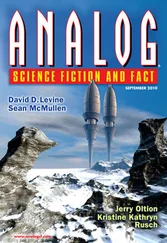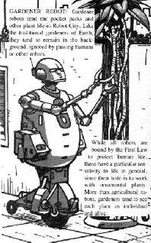Jerry Oltion - Fait Accompli
Здесь есть возможность читать онлайн «Jerry Oltion - Fait Accompli» весь текст электронной книги совершенно бесплатно (целиком полную версию без сокращений). В некоторых случаях можно слушать аудио, скачать через торрент в формате fb2 и присутствует краткое содержание. Год выпуска: 1995, Издательство: Dell Magazines, Жанр: Фантастика и фэнтези, на английском языке. Описание произведения, (предисловие) а так же отзывы посетителей доступны на портале библиотеки ЛибКат.
- Название:Fait Accompli
- Автор:
- Издательство:Dell Magazines
- Жанр:
- Год:1995
- ISBN:нет данных
- Рейтинг книги:3 / 5. Голосов: 1
-
Избранное:Добавить в избранное
- Отзывы:
-
Ваша оценка:
- 60
- 1
- 2
- 3
- 4
- 5
Fait Accompli: краткое содержание, описание и аннотация
Предлагаем к чтению аннотацию, описание, краткое содержание или предисловие (зависит от того, что написал сам автор книги «Fait Accompli»). Если вы не нашли необходимую информацию о книге — напишите в комментариях, мы постараемся отыскать её.
Fait Accompli — читать онлайн бесплатно полную книгу (весь текст) целиком
Ниже представлен текст книги, разбитый по страницам. Система сохранения места последней прочитанной страницы, позволяет с удобством читать онлайн бесплатно книгу «Fait Accompli», без необходимости каждый раз заново искать на чём Вы остановились. Поставьте закладку, и сможете в любой момент перейти на страницу, на которой закончили чтение.
Интервал:
Закладка:
Fait Accompli
by Jerry Oltion

Illustration by Janet Aulisio
I woke for the 146th morning to the sound of wind. Even so it took a minute to place myself. I wavered on the border between sleep and wakefulness, unsure which sensations to choose as real. In the confusion that comes with waking I couldn’t decide if my Universe was the one where wind shrieked and whistled overhead without a break, of if mine was the one where beautiful women aged eighty years in my arms. They seemed to blend together at times, the wind becoming the labored breathing of the dying woman, or the woman lifting up and blowing away through the walls.
I rubbed my eyes and broke the moment. The withered crone that had been Roxanne evaporated away. The wind grew stronger.
I had been on Glacia for nearly six months by Earth’s calendar, and in that time the wind had never once let up. I heard it roaring every moment of my waking day. My shelter, an insulated dome anchored to the slow-moving ice, muffled the sound to a distant rumble, but the walls couldn’t block it out completely. I had grown used to it, but it was always there. Only in my sleep could I find escape from the wind, but other torments awaited me there. Wind and dreams, mortar and pestle for my sanity.
The wind: it starts as a mass of air cooling over the pole. Convection brings it in from warmer climes to gather in a high-pressure cell over the north polar plateau, where it slowly loses its heat to space and falls. The air that comes in contact with the ice cools still further, but since it can’t fall it spreads out, still cooling, pushed by the descending air behind it until it crosses the hundreds of kilometers of plateau and runs up against the mountain range that separates the plateau from the basins beyond. The mountains are nearly buried in ice; momentum and pressure force the cold air through passes and over ridges to fall again down the glacier-filled canyons beyond and pour out into the basin, accelerating all the way. By the time it reaches weather station Delta—1500 kilometers from the pole—it’s doing at least a hundred kilometers an hour, and it hits like the blast of a rocket engine.
The dreams: Blonde hair in a frenzy of tight curls, framing a face with soft cheekbones, wide-set green eyes and a narrow, high nose above a mouth that always carried a hint of a smile. Roxanne. She was half a head shorter than me, and slender. I could slip one arm completely around her, but when I tried it in my dreams she would change. Her hair would gray and her eyes would lose their gleam and her smooth skin would wrinkle and hang in folds. The closer I held her the older she grew, until she was nothing but skin covering a loose frame of bones, peering out at me through eyes sunk deep in their sockets. And then she would speak.
Her voice was the same voice I knew, the voice of a woman in her mid-twenties. From that time-battered frame, the voice of youth would ask, “Do you still love me, Tony? Do you still love me?”
My analyst said I did. I quit talking to it after that, not because it was wrong so much as because it was obviously malfunctioning. A good counselor never tells you how you feel; it lets you discover that for yourself. So I kept myself sane without its help, spending my time reading, watching movies, listening to music, and maintaining the weather instruments.
I wasted little of my conscious time thinking about Roxanne. Riding a starship that traveled at almost the speed of light, I had put forty light-years of space and eighty years of time between us (for it’s a two-way trip), and if there’d been a planet farther out that would have taken me I’d have gone. Relativity kept me from aging during the trip; more distance merely meant more time gone, which was fine with me. I didn’t want to see Roxanne or even think of her again. After our divorce I’d sold everything she didn’t take with her, signed on with the World Restoration League, and jumped ship for Glacia, where I’d hoped to lose myself in the fascination of studying an ice age in progress.
I should have read the brochure. Meteorologists on Earth did all the studying; I was there to collect data. Actually I was there for less than that. The weather station collected the data automatically, but under the extreme conditions found on Glacia even the sturdiest equipment breaks down occasionally. I was the repair person. I functioned in my official capacity maybe once a month, usually when a piece of flying ice smashed one of the sensors. Then, for an hour or two, I would glory in a sense of purpose as I fought with the wind and the clumsy gloves of my environment suit, holding onto a safety rope all the time to keep from being blown away while I fixed the damaged instrument. Two hours of work every twenty or thirty days, and Glacia’s days were thirty hours long.
At that, I paid my way. There were only seven weather stations on Glacia, and each one was worth more to the people on Earth than it cost them to keep it manned. They were fighting their own ice age there, and the information we collected helped them to better understand what they were up against. Glacia had done what we were afraid Earth would do this time: frozen all the way to the equator, its once-temperate climate locked beneath a sheet of ice that would endure for millennia, if not forever.
Glacia wasn’t the only study planet. Explorers had discovered dozens of Earth-like worlds that had died in dozens of different ways, and we studied each of them to leam what not to do with Earth. A steady stream of survey ships coasted in an immense loop between star systems, collecting data, resupplying the stations, and rotating personnel from job to job so they wouldn’t grow overly bored or go crazy from the isolation.
So I wasn’t surprised when the radio buzzed for attention on the morning of day 146. I’d been expecting it for a couple of days by then, trying not to dwell on it and succeeding only when I slept. The supply ship had come, and I was getting out of there. Six months earlier than I’d contracted for, but I didn’t think I’d have any trouble convincing the people in charge that I was due for replacement.
I had set the radio in the middle of the dome where I could reach it from practically anywhere. When it buzzed I leaned over from the table/desk beneath the dome’s only window and picked up the receiver, a narrow-band blind set, and said, “Delta station, Stratton here.” My voice was gravelly from disuse; I’d given up talking to myself except in emergencies.
A woman’s voice said, “Hello down there. This is Elizabeth Duvall, commanding the starship Nereid. What is your condition?”
“Well, I’ve got good news and bad news,” I told her.
“Oh?” She didn’t sound amused.
I didn’t particularly care. I said, “The good news is, the station’s fully functional.”
After a pause, she finally asked, “And the bad news?”
“The bad news is, I’m not so sure about me.”
Her tone changed instantly from annoyed to concerned. “What’s the matter? Do you have a medical emergency?”
I laughed. “No, no. But I think I might before the next six months are up. I want to be rotated out of here this time instead of next.”
There was a considerably longer pause than before.
“What’s the matter?” I asked, suddenly sweating. The dome seemed to constrict around me. “You do have a contingency plan for this, don’t you?”
Duvall hummed thoughtfully. “Oh yes, of course. If you really need replacement, we can do so. Of course our counselor will want to discuss it with you. Could you transmit your analysis program records so she can prepare for the meeting?”
Читать дальшеИнтервал:
Закладка:
Похожие книги на «Fait Accompli»
Представляем Вашему вниманию похожие книги на «Fait Accompli» списком для выбора. Мы отобрали схожую по названию и смыслу литературу в надежде предоставить читателям больше вариантов отыскать новые, интересные, ещё непрочитанные произведения.
Обсуждение, отзывы о книге «Fait Accompli» и просто собственные мнения читателей. Оставьте ваши комментарии, напишите, что Вы думаете о произведении, его смысле или главных героях. Укажите что конкретно понравилось, а что нет, и почему Вы так считаете.












